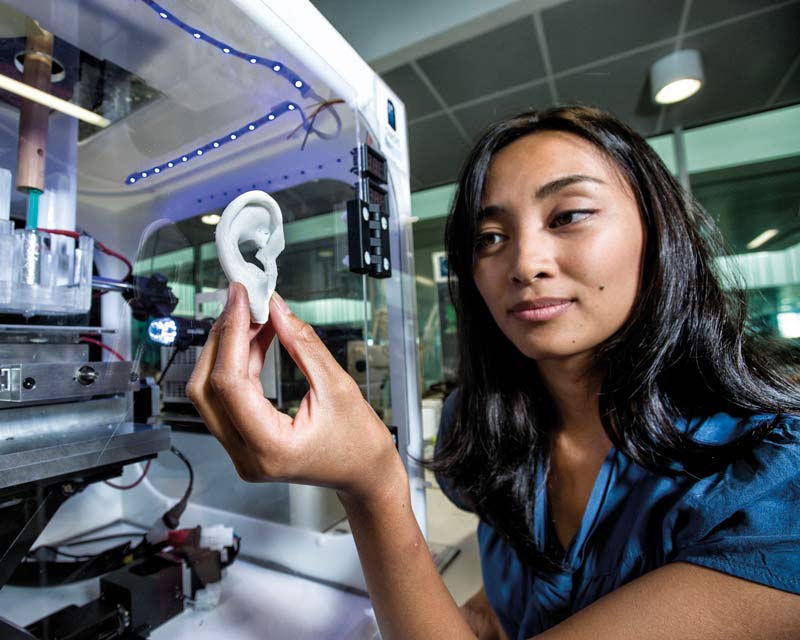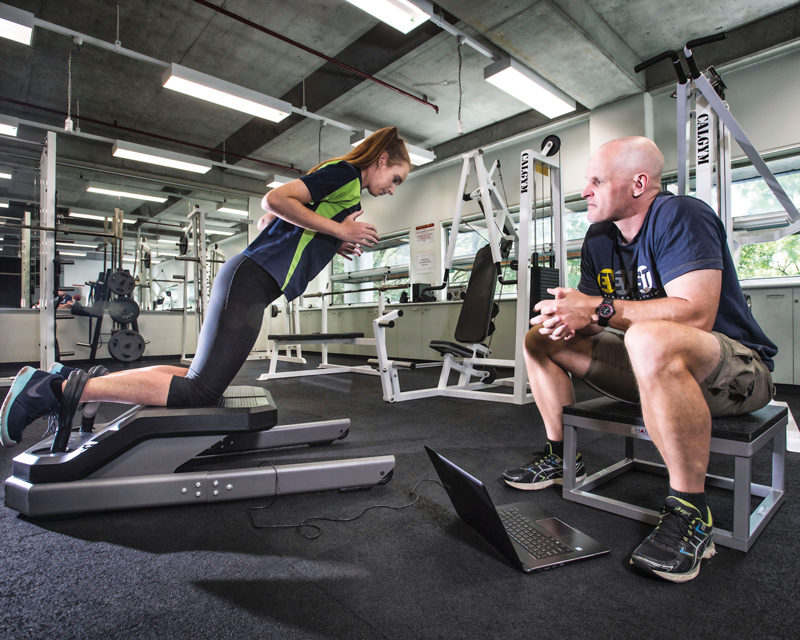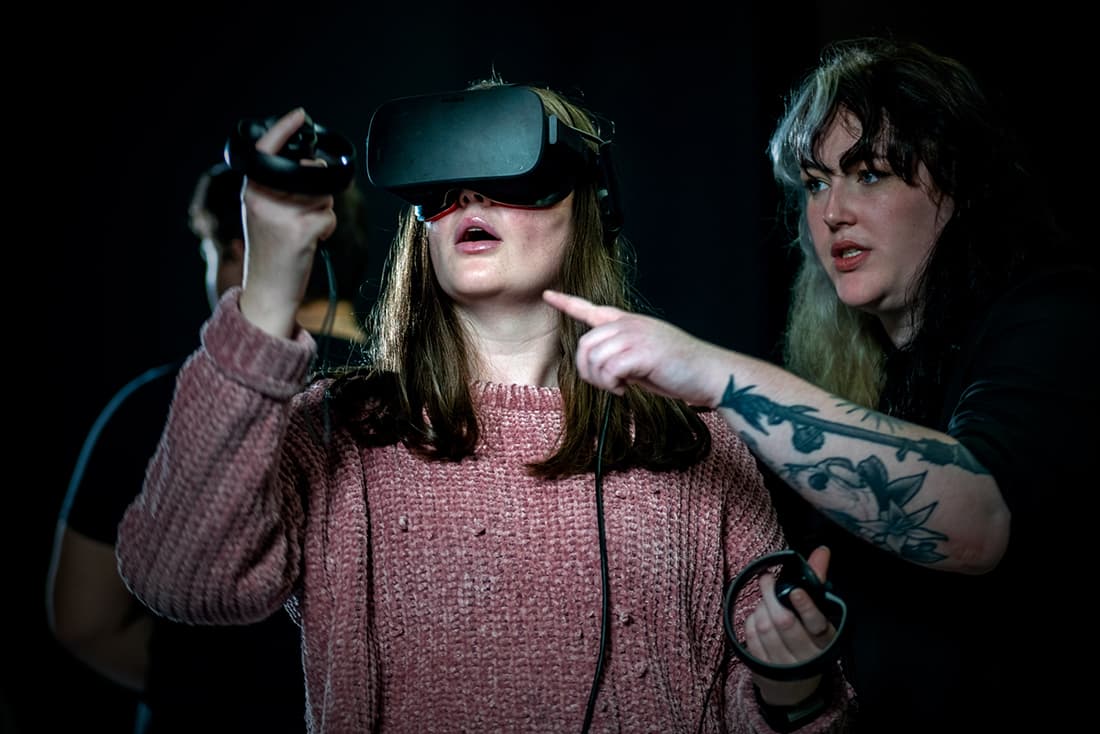Why QUT

Develop
Build your high level research and analytical skills and make a significant and original contribution to new knowledge in your chosen field, or make a significant and original adaptation, application, and interpretation of existing knowledge.

Access
Apply yourself in a supervised program of research and investigation with access to high-calibre facilities and resources and present your research findings after completion of your thesis.

Participate
As part of the research community, participate in university scholarly activities such as seminars, workshops, and teaching, and be encouraged to publish as part of a strong and flourishing research culture.

Recognition
Opportunity to graduate with an internationally recognised degree and follow an academic career in both teaching and research or advance your professional career prospects outside academia.
Our strengths, study areas and projects
We prioritise areas of research identified as significant for the world, the nation, and the state.
Our research seeks to address national and global cultural, environmental, economic and social challenges. In each of these areas we're continuing to build on the strength and experience of our experts.
Funding your research degree
If you're an outstanding graduate and aspiring researcher, you may be eligible to apply for a scholarship in our annual scholarship round.
You can also apply for other research scholarships to help you with study and living costs.
You may also be eligible for the Equity Scholarships Scheme if you are struggling financially.
If you're an Australian citizen or permanent visa holder, or a New Zealand citizen, you may also be eligible for Centrelink payments.
Applying for a research scholarship
Browse our research scholarships

What to expect

Impact
Our PhD program offers the opportunity to work with an experienced supervisory research team to make a significant and original contribution to new knowledge, or to make a significant and original adaptation, application, and interpretation of existing knowledge, in your chosen field.

Challenge
The program challenges students to become independent researchers who develop new ideas, new theories, methodologies and models or new ways of approaching existing problems. Therefore, the research must reveal high critical ability and powers of imagination and synthesis and as such may shape the future of the profession or discipline.

Collaboration
We adopt a project management approach in our PhD program where students work closely with their supervisory team to meet collegially reviewed milestones leading to timely submission of a thesis for examination. This approach contributes to QUT’s timely completions and low attrition rates. The length of the thesis varies according to the topic, but should normally be no longer than 100,000 words, excluding bibliography.

Direction
During candidature the supervisory team and other key stakeholders also provide advice and direction to encourage participation in university scholarly activities such as research seminars, teaching, and publication. These activities enable students to develop wider knowledge and high level generic skills including transferable skills for careers outside academia.
PhD graduates are considered to be highly employable in a wide range of occupations within academia, including academic and research roles.
Employers outside academia recognise the wider knowledge and skills HDR graduates possess, in particular transferable skills – including research, analytical, and quantitative skills, outstanding verbal, written, and interpersonal communication skills and the ability to solve intricate business problems.
Career development
Our Graduate Research Education and Development team offer a wide range of career development workshops to help you obtain your dream job including workshops to help you:
- identify professional, transferable, and personal skills
- understand the complex job market
- utilise your networks to leverage opportunities in and outside academia.
Find your career
Business and law careers
- Academic
- Accountant
- Actuary
- Banking and finance professional
- Barrister
- Business analyst
- Crown law officer
- Digital economy lawyer
- Diplomat
- Economist
- Financial analyst
- Financial project manager
- Funds manager
- Government officer
- Higher education worker
- Human resource manager
- In-house counsel
- Information officer
- International business specialist
- Investment manager
- Lawyer
- Legal technology specialist
- Manager
- Marketing officer/manager
- Organisational communication specialist
- Policy officer
- Risk manager
Creative industries, education and social justice careers
- University teacher and/or researcher
- Educator
- Criminologist
- Media advisor
- Author
- Design researcher
- Creative practitioner
- Entrepreneur
- Policy advisor, consultant or senior leader in:
- education
- private enterprise
- government
- child development
- design
- arts
- entertainment
- criminal justice
- social justice
- NGOs
- media
- communication.
Engineering careers
A Doctor of Philosophy with the Faculty of Engineering can provide you with the skills and expertise to work in the public or private sectors, or in academia, in areas including:
- Aerospace engineering
- Architecture
- Artificial Intelligence
- Building science
- Built environment
- Chemical engineering
- Civil engineering
- Computer and software systems
- Construction management
- Electrical engineering
- Environmental engineering
- Interior architecture
- Landscape architecture
- Mechanical engineering
- Mechatronics
- Medical engineering
- Process engineering
- Project management
- Quantity surveying
- Renewable power
- Robotics
- Transport engineering
- Urban design
- Urban and regional planning
Health careers
- University teacher and/or researcher
- Discipline specific researcher
- Policy development and regulatory functions with government and regulators
- Research and development, and advocacy, in the charitable/not-for-profit sector
- Applied research and consulting in industry
- Data analyst for government and industry
- Research-scientist practitioner (clinical pathway)
- Health economist
- Implementation scientist
- Optometry practice
- Contact lens or spectacle lens industry
- Ophthalmic instrument manufacturing
- Clinical work - private and hospital-based
- Radiation therapy clinician
- Clinical dietician
- Clinical lab coordinator/manager
- Sports scientist
- Head strength and conditioning coach
- Hospital/medical consultant
- Entrepreneur (biotechnology, pharmaceuticals, health technologies)
Science careers
- University teacher and /or researcher
- Science communicator
- Policy scientist
- Software engineer
- Systems analyst
- Web developer
- Developer programmer
- Cybersecurity analyst / engineer
- Database administrator
- ICT analyst / support engineer / technician
- Mathematician
- Statistician
- Data analyst
- Data scientist
- Computational scientist
- Forensic scientist
- Chemist
- Physicist
- Atmospheric scientist
You'll need to:
- complete a time-based thesis
- complete IFN006 AIRS: Advanced Information Research Skills
- complete other units as agreed by the student in negotiation with their supervisor and faculty
- agree on a start date with your supervisor (except creative industries and education disciplines which have specific start dates. The how to apply guide has further details).
Download the Higher Degree by Research course regulations (PDF file, 335.3 KB)
Academic entry requirements
You must have either:
- a completed recognised relevant honours degree (first class or second class Division A) or equivalent
- a completed recognised masters degree or professional doctorate (by research or coursework).
Masters and professional doctorate degrees by coursework must have a significant research component, normally not less than 25%. Holders of masters and professional doctorate by coursework must:
- have a minimum grade point average (GPA) score of 5.0 on QUT's 7 point scale
- and present evidence of research experience and potential for approval.
Admission to the Doctor of Philosophy depends on an applicant’s demonstrated research aptitude and the availability of supervision, infrastructure and resources needed for the proposed research project.
PhD students need to complete the Stage 2 milestone (usually completed within the first three months of full time study) to be fully admitted to their course.
Download the admission criteria for the Doctor of Philosophy (PDF file, 280.6 KB)
Minimum English language requirements
For information about minimum English language requirements, refer to the requirements on the Doctor of Philosophy course page.
Australian citizen or permanent visa holder, or a New Zealand citizen
If you're an Australian citizen or permanent visa holder, or a New Zealand citizen, your tuition fees are normally covered by the Australian Government Research Training Program (RTP) Fees Offset (Domestic), as long as you complete your degree within the program's set timeframes. You may have to pay tuition fees if you exceed the time limits under the RTP.
Learn more about RTP and financial support
International fees
International students who enrol in a QUT research degree will receive a tuition fee sponsorship if they are in receipt of:
- a stipend scholarship awarded by QUT
- a stipend scholarship funded by an organisation with which QUT has an external agreement to sponsor fees for this student or relevant cohort of students.
Candidates will not be eligible if they receive another tuition fees offset or sponsorship from any source, including QUT.
You cannot apply for a tuition fee sponsorship; your eligibility is reviewed via your application for admission.
If you have to pay fees, the amount may vary depending on which units you choose. We review fees annually, and they may be subject to increases.

Find a supervisor and research topic
We recommend you discuss your research interests with your proposed supervisor early in the application process. You can search for a supervisor using our experts database.
As part of your application, you must propose a research topic and develop a research proposal. You can search our student topics database for available research projects or propose your own research topic. You may ask a supervisor to help you identify or refine a research topic.
Contact us
If you have questions about the best options for you, the application process, your research topic, finding a supervisor or anything else, get in touch with us today.